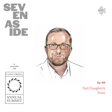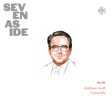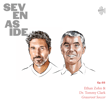Become a Creator today!Start creating today - Share your story with the world!
Start for free
00:00:00
00:00:01

Vaughan Gething MS
The Welsh Government's Minister for Economy on the country's development vision, its special ties to America, the edge in semiconductors and clean tech and the vital importance of maintaining stability and optimism
Transcript
Wales' Cultural and Economic Resurgence
00:00:01
Speaker
At the risk of cliche, it can be said that Wales is having a cultural moment owing to football. The nation is fielding its first World Cup squad in well over a half century. Native son Gareth Bale, this year's bold-faced MLS signing, played no small role in Los Angeles Football Club's title run, and a small northern town has fast become a global name thanks to the purchase of its FC Rexham by an unlikely duo from across the pond.
Economic Strategy with Vaughn Gething
00:00:21
Speaker
However, the soft power surge hardly scratches the surface of a vibrant, diversified, forward-looking economy that has shown remarkable resilience, innovation-mindedness, and growth despite the macro-headwinds of recent years. Furthermore, staking international leadership for this nation of around 3 million in critical sectors like semiconductors, electric vehicle batteries, and aerospace.
00:00:40
Speaker
mere hours before Wales and the USA kick off in Qatar. We sit down in Washington with Vaughn Gething, Minister for Economy for the Welsh Government, to learn more about the country's development vision, get special ties to America, and the importance of maintaining stability, momentum, and optimism. Well done, Minister Gething, and thank you very much for being with us today.
00:01:01
Speaker
Not a dire, but a pleasure to be here. Firstly, in the spirit of the day, explain, if you will, the special kinship between Wales and the U.S., one of Wales' largest trading partners, economically and culturally, to what does this owe?
Historical Ties: Wales and the U.S.
00:01:14
Speaker
Well, there's a longstanding relationship between the United States and Wales. There have been Welsh people here right from the outset. So on all sides of debates in long-standing American history and more recently, I find people of Welsh origin.
00:01:28
Speaker
I think the majority of people on the signatories to the Declaration of Independence, Welsh. You'll find Welsh language at the bottom of the Washington Monument here in DC. And you'll find lots of people with Welsh surnames all around the country, black and white people as well. So it shows we're on both sides of that divide too.
00:01:46
Speaker
But it continues. So you don't just have, you know, the more famous expats in both directions. So not just Katherine E. Jones and Katherine Jenkins people have heard of, but in the other direction, Ryan and Robert Rexham and the story of their investments, not just in the financial sense, but their investment in the wider culture of Rexham and Wales as well. And when it comes up to modern times, of course, there's a real fascination. America's quite a young country in world history.
00:02:12
Speaker
And Wales is a very old country with lots and lots of different history from castles, coastlines, mountains, and a really great friendly welcome, but with modern industry within it as well, quite an open country with a real welcome. But in areas of technological advancement, in areas of advanced manufacturing, in areas of scientific endeavor and innovation, you'll find Wales has a story to tell and is keen to have continuing partnerships with America and the wider world.
00:02:39
Speaker
And so going forward, where the critical or, in your view, most promising opportunities between the two, especially in some of the emerging or fledgling sectors you speak of, where do you see the Wales, USA, simpatico expressed most vigorously?
Aerospace Powerhouse: Wales' Global Impact
00:02:52
Speaker
Even in maturing this like aerospace, you know, we've got about 20% of maintenance repair work in Europe takes place in Wales, which you wouldn't necessarily think a small country, about three and a half million people,
00:03:03
Speaker
But it's a real genuine world-class manufacturing, repair and maintenance industry. We've got real partnerships with the defense sector, as you'd expect from aerospace too. And then in those, so not just advanced manufacturing, some of the newer sectors as well in
00:03:18
Speaker
cyber, in FinTech, but also in the semi-compound cluster we've got. That's a big deal here and in the wider world about people's access to chips, some of the shortages and the challenge that's led for standard things like cars and TVs, never mind the world of the future.
00:03:35
Speaker
where the generation that's coming on with the compound semiconductors will be even more important, the ability to power what's happening. And it also matters for fledging space sector as well, where in-space manufacture could end up generating even more efficient operational ability as well. So it's quite exciting in that sense.
00:03:55
Speaker
And then of course you've got, as I was saying, you know, Wales got a fantastic coastline as a tourist, but it also means we've got huge opportunities for wind and wave power off our coast as well. And the challenge of continuing to live a good standard of life, but generating our power and then using our power.
00:04:13
Speaker
in a different way that doesn't compromise the future of the planet, we've definitely got a contribution to make. And there's lots of opportunities to invest in that, not just in a sense of how that power is generated, but actually the learning on how to do things even better in the future. And so not just floating offshore wind, but I certainly think in broader marine energy and tidal flow energy, we've got lots and lots of opportunity in an industry that is being created
Semiconductors and Strategic Investments
00:04:36
Speaker
in Wales. And so the semiconductor cluster is something that had really struck our interest
00:04:41
Speaker
It's such a high stakes and geopolitically sensitive area. How did this come about? How did this focus come about? Was this something that was organic? Where specifically within this does Wales see its value proposition?
00:04:54
Speaker
It's a number of different things that have come together. It's the fact that you've got in one place, you've got manufacturers, you've got innovators, you've got research, you've got well-regarded universities, largely in Wales, but collaborations with English research universities too. And you've got something there with a cluster that's been deliberately built around each other. And I'm proud of what the Welsh Government has done before I was the Economy Minister, as well as in my time as well, in investing in bringing that cluster of people together.
00:05:20
Speaker
And you're then seeing people having a real interest in investing in it. So you've got the KLA corporation recently announced a multi-million dollar investment to both increase their manufacturing capacity, but also to have even more research development innovation capacity there as well. So you've got really quite big names. And from a US point of view, I think having all of those things in an area where there's a friendly and a stable government,
00:05:45
Speaker
And when we're interested in understanding some of the sensitivities around it, that's a definite plus. And the choice the UK government have made around clarity over the ownership of Nexperia provides Evan with that clarity. So you understand what's now happening. So there won't be an ultimate Chinese end ownership within the cluster. And I know that's sensitive and important for US investors too. So we now want to see the opportunities that exist there really move forward. You've got all the skills and the pipeline of people that you need.
00:06:14
Speaker
in place around the sector too. Could the same be said to your focus on battery electric vehicle or batteries for electric vehicles and your development in that area? Is it the same factors that are contributing to that focus and what is the niche or the concentration within this?
00:06:30
Speaker
Again, I think a number of the things are aligning that have definitely make the semiconductor cluster work. So you've got the ability in a fairly concentrated area to have research capacity, private sector and university. You've got people who are already having investment in the future of innovation and creating from the more mature technologies around batteries. We've got long standing battery producers from America and the US in South Wales, but also look at the new way. So sodium instead of lithium was a way to try to generate some of that.
00:06:59
Speaker
You've then got the opportunities around electric powered vehicles, hydrogen fuel cells. So the cars, electric, heated hydrogen cells are on it. We've got real interest in those. And one of the things I think whales can do as a small country, you can often tell what things you can't do. What you can do being a small country is you can get decision makers and you can get them into a room together.
00:07:19
Speaker
And the Welsh government can often help to convene and bring those people together. That should hopefully shorten decision-making timescales, but I have honesty about what is possible as well as what isn't of our real clarity for investors about what you'll get coming to Wales. And the fact there's a government that really wants to see business succeed, because in this sector, we should see high-skill, high-value jobs. And it's part of our journey towards
00:07:44
Speaker
net zero as well. In the US and indeed in other parts of Europe, there's interest in learning and coming with us on that journey. And given the size of the country, is there more of a diffusion of the gains of these industrial focuses? Are they concentrated in certain areas?
Industrial Growth and Decarbonization
00:08:04
Speaker
Along lots of South Wales, we've got lots of research opportunities and development, but all around the coastline, you've got lots of opportunities to come from power generation.
00:08:12
Speaker
And to get from blue to green hydrogen, I think every part of Wales, because of the capacity to generate power as it stands, but also the capacity to generate potential green hydrogen production, I think you're going to see all parts of Wales. You've got a collaboration from North West England, right across North Wales on the hydrogen. You've got interest in investment in all across South Wales, a South Wales industrial cluster,
00:08:35
Speaker
how you get to decarbonize without sacrificing traditional industry. So a new way of delivering steel that doesn't actually mean you're having the same environmental impact. So there are concentrations and clusters within different parts of Wales, but I'd say that for anyone who's seriously interested in investing in Wales, we're just a team here to talk to, but there's a team of people in the government who can help to guide people to where those opportunities are most likely to be.
00:08:59
Speaker
And to try to link people up with potential investors and research collaborators as well.
Space Industry Innovations
00:09:04
Speaker
You mentioned the burgeoning space industry. That too strikes a particular chord with us. Talk a little bit about the vision.
00:09:11
Speaker
Well, we've got four or five really interesting startup companies. So you've got one company called B2Space where they've got essentially a balloon that part floats something up before it then goes to the liftoff. You take out some of the challenge in liftoff. It's a simple but a smart idea. And they're going through another investment round. There's real interest in them and some of the smaller space launches are also sub-orbit as well.
00:09:34
Speaker
They've also really helped to map out some broader challenges around climate. You can map changes in your physical footprint around the country too. So that's fascinating. Spaceforge, the other companies probably, they are looking to launch the first Welsh-made satellite, and that's the one where they're looking at in-space manufacture.
00:09:51
Speaker
you're essentially manufacturing in a vacuum, and that apparently brings multiple benefits in terms of what you get, and it can make a real difference in terms of what you know about chips, but about the capacity and the efficiency of those. So the first test is really to get to the next point where you can then test more and more the manufacture capabilities, and that's
00:10:09
Speaker
a company that's chosen to base itself in Wales because of how they see the broader environment. So I'm really proud that those people are deliberately choosing to base themselves in Wales and they've got small companies with a big vision. Sure, sure, sure. I find it interesting when you take a step back, when you think about it, Wales in striking ways silhouettes the world's fifth largest economy, California. And I know California and the West is of particular interest to the Welsh trade mission.
00:10:37
Speaker
What about that region is so valuable to you? Wherein do the opportunities lie? Wales is a modern, outward-looking economy, and California is a very large economy that's looking outward as well. It's also needing to deal with the challenge of how to still be economically successful whilst thinking about your impact on the wider climate as well. And so some of that is directly relevant to us, the opportunities for power generation in different ways, the importance of investing in people,
00:11:06
Speaker
Because lots of our world will change in the coming years. We'll do things in different ways. We'll have new ways of doing things too. But you're still going to need to invest in the capacity of people to do a range of those jobs in the skills and the return. That for us is really important about an inclusive future where you don't leave people behind. Part of my role in the government is I've got responsibility for our skills program investing in people in apprentices.
00:11:30
Speaker
And those people are already in the world of work as well. And every modern economy is still having to look at how do we go forward and still have a value proposition for workers, for working people.
00:11:42
Speaker
for what they're going to do, not just the convenience to your life and these products, but actually how will they be created and what will that mean for a person and what they can do in terms of the job they're going to have as well. And so that's quite exciting. And at the same time, the chain can be disruptive and awkward. So managing those things is part of our challenge in government, but it's also our challenge in working alongside people who are going to be doing some of the doing in industry. So that's a challenge where I think, you know,
00:12:09
Speaker
Wales and California never seem the direct juxtaposition of the similarity. California has slightly more sunshine, we have better rugby.
00:12:17
Speaker
And obviously, hopefully, today we'll prove that we've got menisaca. But look, I think that the deliberate willingness to see those things as comparators, all the tech sectors, so gaming, cyber, fintech, all of those areas, we've got industries that definitely marry across to each other. As I understand it, you have a relatively new envoy strategy. And how does that intermingle with your broader strategy?
00:12:43
Speaker
Our envoys are people with a link and an affinity to Wales, and they're looking to help us, to help open doors to have more conversations. So in America we've got LaShawn, used to work at G, now works at Amazon, we've got Aled Miles, and that's about them having
00:13:01
Speaker
links they've created. I wanted to give something back to Wales. You know, LaShawn lived in Wales and really loved being part of our story. And that's one of the things we want to get over. Wales really is a great place to go. People are really friendly, but actually there are people on to work hard and be successful in the future as well. And it's how our invoice can help us to open doors and to raise a profile that might not otherwise be here.
00:13:21
Speaker
And obviously the Football World Cup was a huge opportunity to do that as well. Not having been there for 64 years, having a profile where Wales is mentioned in every conversation in the US with the first game coming up. But then through the rest of the tournament, if only how we do, we'll have an opportunity to do things on the back of that. If people know where you are, they're more likely to know who you are and what the opportunities are to work with us.
00:13:44
Speaker
A sizeable slice of our audience is creative industry, film and media in particular. I know this is a priority for Wales as it is for many countries and territories. If you can speak to Wales opportunities and value proposition here, how are you attracting foreign capital and what are some of the milestones in the effort that you can point to?
Creative Industries and Pandemic Recovery
00:14:04
Speaker
So the creative sector has, we're seeing growth before the pandemic and then obviously lots of things pause. Something still carried on because people had to work in different ways and
00:14:13
Speaker
What we've actually seen is not just, if you like, the pent-up demand from the pandemic with things like filming and production, actually it's sustaining well beyond that as well. And I think that again is the impression that Wales is a really good place to work because people are on your side and want things to happen. The value in terms of what you get from coming to Wales, and again, the point about investing in people and the skills to do things. So I'm really pleased with the fact that our creative sector is growing and expanding so much. And again, there's international interest in what we're doing.
00:14:43
Speaker
So for us it's about how do we capture and keep that moving forward. So don't simply say we're doing really well, everything will be fine. To still be curious about what more we can do with other parts of the world. And when people do come to Wales, we make sure they do have a great experience and want to come back again. And find their own, not just willing partners, but partners with real ability to help add more value for the future.
00:15:06
Speaker
And you see that, you know, the gaming world, you know, the gaming world is really fascinating because lots of the skills to get on there are directly relevant and transferred to a whole range of other areas. You know, lots of world had to go online for the first time, which sounds odd for some people, but there were lots of people who had businesses which never had an online presence and they've had to go through the basics of getting online. It then had to do with some of the challenges that come with it, how to keep your business and your customers safe as well. And so actually the cyber world, there's lots of basic stuff out there.
00:15:34
Speaker
that is needed as well as the more sophisticated end of what might happen to. And we've got lots of that too. And you see a crossover between that and people in creative sectors and understanding what they need to do. So there's a real skills proposition there that we're looking to invest in. Big picture. Given macroeconomic and political uncertainties in the UK and globally, what are
Navigating Global Economic Challenges
00:15:54
Speaker
the headwinds whales must navigate in the short term? And how does it see its role in the global Britain agenda?
00:16:00
Speaker
A period of stability at the UK would be welcome, and that would help all of us. It's much better to have a plan you disagree with, rather no plan at all, and not knowing what's going to come day to day, never mind week to week. And it's then important that Britain in the wider world makes promises that it keeps as well.
00:16:19
Speaker
The Welsh government, I think, has a really good reputation for doing that. You'll find real stability in the government of Wales. We don't have governments that change with the regularity that's happened elsewhere. And we've got a reputation, I think, for manifestors and programs with governments tend to get delivered. The headwinds are
00:16:35
Speaker
the overall challenge to the economy globally, the realities of inflation, and how we get on top of that without compromising people's future. If you have a lost decade where there's no growth at all, that would have lots of scars, especially for young people going into the world of work for the first time, and people who may lose their jobs at the other end of working life may think I'm never going to work again. So to carry on in that theme of investing in people to make sure they still get opportunities to come into the world of work,
00:17:03
Speaker
There's an odd thing here because on the one hand, people should be concerned about unemployment and about a slowdown and a lack of growth. At the same time, lots of sectors got a real challenge getting labor in, having enough people with the right skills to do the work that's required. I don't think it'll be like
00:17:21
Speaker
previous potential slowdowns with the UK being likely in recession, there'll be some areas that will still grow. And in the areas we talked about, I think they'll still continue to grow. There'll still be investment in new forms of renewable energy. There'll still be investment in compound semiconductors. There'll still be investment in cyber fintech. So you're going to see those carry on growing. And what we need to do is give people there the opportunity to carry on growing while supporting industries that we're certain have a longer term future.
00:17:47
Speaker
And the challenge will be malleting that at a time where our budgets may not be as they would have been a few years before, but then still with our people that elect us and expect us to do the job for them, to show that there's a vision that the future has some hope with it as well. Saying everything will be miserable and there's no hope of the future isn't much of a prospectus for anyone. And I think we have room for optimism that is founded in reality.
00:18:09
Speaker
Well, speaking of optimism, it should be noted again that in a matter of hours, Wales kicks off against the United States, marking the, as you mentioned, the first World Cup appearance in over 60 years. You touched on football diplomacy and how this soft power watershed can translate into trade relations.
Cultural Values in Trade Amid Controversy
00:18:28
Speaker
It's not without 11th hour controversy this World Cup as Wales and several other nations decided to forego the one love captain's armbands for fear of reprisal by FIFA. Beyond the tournament for a country as outspoken on human rights, how can Wales uphold and assert its cultural and social values in trade relations with a country like Qatar? It's important that when people see Wales in the World Cup, they'll see our values. So you'll see the First Minister carry on talking about the country we are.
00:18:58
Speaker
You'll see me, Karen, doing that as well. You know, we've been on a journey ourselves, but we are proud of who we are as a modern, outward-looking nation. We're not about to sell out our own communities of people. The challenges literally of today
00:19:13
Speaker
are really about FIFA not being prepared to live what they say are their own values as well. The one love armor is just about saying that it's okay to be who you are and to fall in love as you are. And the fact that FIFA are taking a stand on that has threatened potential sporting reprisals for that, I think reflects very, very poorly on that.
00:19:33
Speaker
and you know the next World Cup is going to be here in North America if we have a real job to do and rediscovering whether they really want football to do the talking whether they're prepared to take this quite unprecedented action any further. I hope there's an attack of common sense and we'll carry on talking very proudly about our values whether they're human rights for workers or whether LGBTQ plus community or women this is the country we are and the country we're proud to be.
00:19:59
Speaker
Your diplomatic generosity and selflessness being here in the U.S., not back home for this historic occasion is certainly not lost on us. So thank you again, all the best to you in Wales for the tournament beyond. Thanks very much. Pleasure to meet you. Many thanks to our guest, Minister Von Gething, with special thanks to the Welsh government. Signing off for Studio Santiago and Kit Magazine, I'm Evan Howell.


















